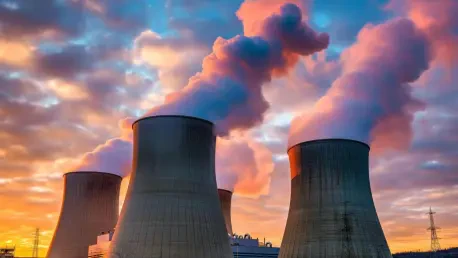India faces a critical juncture in its energy journey, grappling with immense challenges such as surging demand and the imperative of a sustainable future. Presently, the nation is battling environmental degradation while striving to power its burgeoning population and economic growth. This dichotomy presents a pressing need for solutions that not only provide sufficient energy but do so in a carbon-conscious manner. Among the myriad of strategies being considered, nuclear power emerges as a pivotal player due to its potential to substantially mitigate carbon emissions. As India ambitiously targets net-zero carbon emissions by 2070, nuclear energy is positioned as a cornerstone of this effort, promising significant expansion while aligning with global sustainability initiatives. This analysis sheds light on India’s targets, various strategies, expert opinions, and future prospects related to its nuclear power ambitions.
Current Status and Growth Trajectory
Nuclear Power in IndiCapacity and Targets
India currently boasts an installed capacity of 8 gigawatts (GW) of nuclear power, with an additional 7 GW under construction. With the audacious goal of reaching 100 GW by 2047, the country has set forth a detailed roadmap underpinned by the State Bank of India Capital Markets report, which underscores pivotal growth trends. This ambitious plan places India among the countries with significant nuclear expansion targets, striving to compete with global benchmarks in energy efficiency and reduction in carbon footprints.
Real-world Implementation and Initiatives
Strategic initiatives are already in motion, driven by India’s Nuclear Energy Mission, which earmarks ₹200 billion for advanced research and development. Highlighted initiatives include Bharat Small Modular Reactors (BSMRs) and advancements in Pressurized Heavy Water Reactors (PHWRs). Government backing plays a crucial role in accelerating these efforts, ensuring streamlined development and deployment. These projects aim to bolster the private sector’s involvement and galvanize rapid advances in nuclear technology, ensuring timely attainment of India’s energy goals.
Expert Opinions and Strategic Recommendations
Insights from Union Minister Jitendra Singh and prominent industry figures reveal a strong consensus on nuclear energy’s transformative impact on India’s energy landscape. The minister stresses the importance of collaboration and innovation in achieving the country’s ambitious objectives. Key strategic recommendations involve slashing construction timelines from 10 years to the global benchmark of six years. Additionally, raising Foreign Direct Investment (FDI) limits to 49% could attract essential capital and foster international partnerships, boosting technical expertise and resource acquisition.
Future Prospects and Industry Implications
Looking forward, significant breakthroughs are anticipated through partnerships and technological advancements, crucial for meeting India’s nuclear energy targets. Collaboration with international partners is pivotal, especially in light of domestic uranium scarcity, which necessitates diversified fuel sources and accelerated development of the nuclear roadmap’s stages. Overcoming these challenges poses implications not only for India’s energy future but also for its role in global nuclear initiatives, potentially positioning it as a leader in sustainable energy solutions.
Conclusion and Call to Action
Success in nuclear power expansion necessitates concerted efforts across government, private sectors, and global allies. Collective actions would facilitate sustainable energy advancement, transforming India’s energy landscape. Formerly daunting objectives now seem plausible as nuclear power emerges as viable and essential in achieving India’s net-zero targets. Implementing strategic reforms while fostering international collaboration promises a significant shift toward sustainable energy practices. These developments, grounded in innovation and partnership, herald a new era for energy strategies, marking a pivotal shift in both national and global perspectives on nuclear energy.









